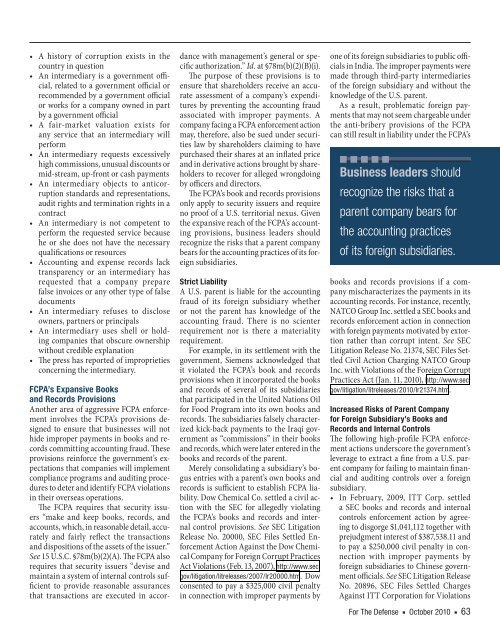For The Defense, October 2010 - DRI Today
For The Defense, October 2010 - DRI Today
For The Defense, October 2010 - DRI Today
Create successful ePaper yourself
Turn your PDF publications into a flip-book with our unique Google optimized e-Paper software.
• A history of corruption exists in thecountry in question• An intermediary is a government official,related to a government official orrecommended by a government officialor works for a company owned in partby a government official• A fair- market valuation exists forany service that an intermediary willperform• An intermediary requests excessivelyhigh commissions, unusual discounts ormid-stream, up-front or cash payments• An intermediary objects to anticorruptionstandards and representations,audit rights and termination rights in acontract• An intermediary is not competent toperform the requested service becausehe or she does not have the necessaryqualifications or resources• Accounting and expense records lacktransparency or an intermediary hasrequested that a company preparefalse invoices or any other type of falsedocuments• An intermediary refuses to discloseowners, partners or principals• An intermediary uses shell or holdingcompanies that obscure ownershipwithout credible explanation• <strong>The</strong> press has reported of improprietiesconcerning the intermediary.FCPA’s Expansive Booksand Records ProvisionsAnother area of aggressive FCPA enforcementinvolves the FCPA’s provisions designedto ensure that businesses will nothide improper payments in books and recordscommitting accounting fraud. <strong>The</strong>seprovisions reinforce the government’s expectationsthat companies will implementcompliance programs and auditing proceduresto deter and identify FCPA violationsin their overseas operations.<strong>The</strong> FCPA requires that security issuers“make and keep books, records, andaccounts, which, in reasonable detail, accuratelyand fairly reflect the transactionsand dispositions of the assets of the issuer.”See 15 U.S.C. §78m(b)(2)(A). <strong>The</strong> FCPA alsorequires that security issuers “devise andmaintain a system of internal controls sufficientto provide reasonable assurancesthat transactions are executed in accordancewith management’s general or specificauthorization.” Id. at §78m(b)(2)(B)(i).<strong>The</strong> purpose of these provisions is toensure that shareholders receive an accurateassessment of a company’s expendituresby preventing the accounting fraudassociated with improper payments. Acompany facing a FCPA enforcement actionmay, therefore, also be sued under securitieslaw by shareholders claiming to havepurchased their shares at an inflated priceand in derivative actions brought by shareholdersto recover for alleged wrongdoingby officers and directors.<strong>The</strong> FCPA’s book and records provisionsonly apply to security issuers and requireno proof of a U.S. territorial nexus. Giventhe expansive reach of the FCPA’s accountingprovisions, business leaders shouldrecognize the risks that a parent companybears for the accounting practices of its foreignsubsidiaries.Strict LiabilityA U.S. parent is liable for the accountingfraud of its foreign subsidiary whetheror not the parent has knowledge of theaccounting fraud. <strong>The</strong>re is no scienterrequirement nor is there a materialityrequirement.<strong>For</strong> example, in its settlement with thegovernment, Siemens acknowledged thatit violated the FCPA’s book and recordsprovisions when it incorporated the booksand records of several of its subsidiariesthat participated in the United Nations Oilfor Food Program into its own books andrecords. <strong>The</strong> subsidiaries falsely characterizedkick-back payments to the Iraqi governmentas “commissions” in their booksand records, which were later entered in thebooks and records of the parent.Merely consolidating a subsidiary’s bogusentries with a parent’s own books andrecords is sufficient to establish FCPA liability.Dow Chemical Co. settled a civil actionwith the SEC for allegedly violatingthe FCPA’s books and records and internalcontrol provisions. See SEC LitigationRelease No. 20000, SEC Files Settled EnforcementAction Against the Dow ChemicalCompany for <strong>For</strong>eign Corrupt PracticesAct Violations (Feb. 13, 2007), http://www.sec.gov/litigation/litreleases/2007/lr20000.htm. Dowconsented to pay a $325,000 civil penaltyin connection with improper payments byone of its foreign subsidiaries to public officialsin India. <strong>The</strong> improper payments weremade through third-party intermediariesof the foreign subsidiary and without theknowledge of the U.S. parent.As a result, problematic foreign paymentsthat may not seem chargeable underthe anti- bribery provisions of the FCPAcan still result in liability under the FCPA’sBusiness leaders shouldrecognize the risks that aparent company bears forthe accounting practicesof its foreign subsidiaries.books and records provisions if a companymischaracterizes the payments in itsaccounting records. <strong>For</strong> instance, recently,NATCO Group Inc. settled a SEC books andrecords enforcement action in connectionwith foreign payments motivated by extortionrather than corrupt intent. See SECLitigation Release No. 21374, SEC Files SettledCivil Action Charging NATCO GroupInc. with Violations of the <strong>For</strong>eign CorruptPractices Act (Jan. 11, <strong>2010</strong>), http://www.sec.gov/litigation/litreleases/<strong>2010</strong>/lr21374.htm.Increased Risks of Parent Companyfor <strong>For</strong>eign Subsidiary’s Books andRecords and Internal Controls<strong>The</strong> following high- profile FCPA enforcementactions underscore the government’sleverage to extract a fine from a U.S. parentcompany for failing to maintain financialand auditing controls over a foreignsubsidiary.• In February, 2009, ITT Corp. settleda SEC books and records and internalcontrols enforcement action by agreeingto disgorge $1,041,112 together withprejudgment interest of $387,538.11 andto pay a $250,000 civil penalty in connectionwith improper payments byforeign subsidiaries to Chinese governmentofficials. See SEC Litigation ReleaseNo. 20896, SEC Files Settled ChargesAgainst ITT Corporation for Violations<strong>For</strong> <strong>The</strong> <strong>Defense</strong> n <strong>October</strong> <strong>2010</strong> n 63
















